Management & Reflective Practitioner: A Report on Practice
VerifiedAdded on 2022/12/28
|7
|1345
|178
Report
AI Summary
This report delves into the core aspects of management and reflective practice, addressing key questions related to managerial roles and responsibilities. The report begins by defining the goals and purposes of an HR manager, outlining the tasks undertaken to achieve these objectives. It then explores the components of managerial work, assessing their alignment with the author's current role and experience. The importance of critical reflection for professional managers is discussed, along with practical examples from the author's experience. Finally, the report examines the concept of reflective practice, offering strategies to enhance self-awareness and improve managerial effectiveness. The report emphasizes practical application and provides insights into improving management skills through self-reflection and continuous professional development, referencing relevant academic sources to support the analysis.
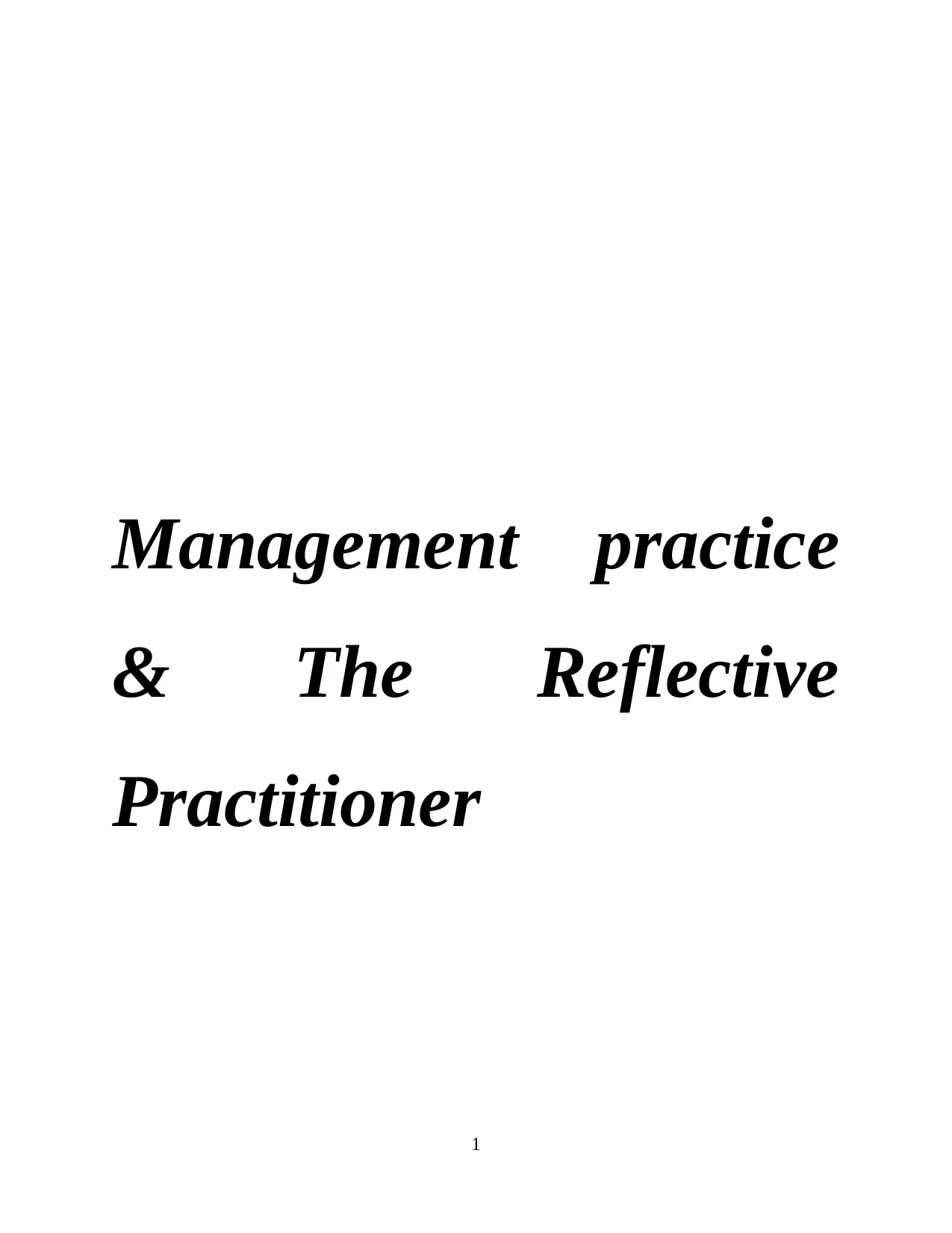
Management practice
& The Reflective
Practitioner
1
& The Reflective
Practitioner
1
Paraphrase This Document
Need a fresh take? Get an instant paraphrase of this document with our AI Paraphraser
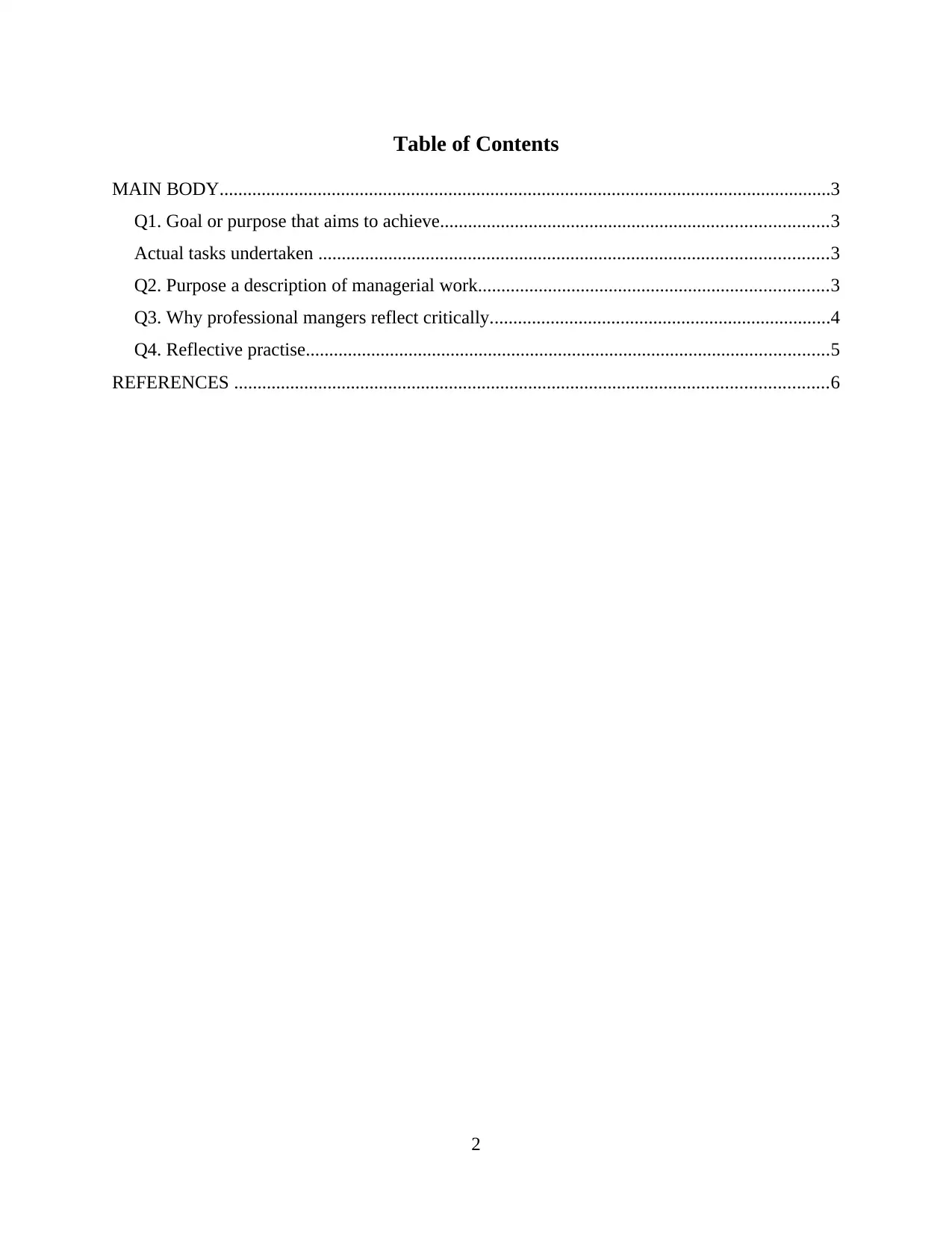
Table of Contents
MAIN BODY...................................................................................................................................3
Q1. Goal or purpose that aims to achieve...................................................................................3
Actual tasks undertaken .............................................................................................................3
Q2. Purpose a description of managerial work...........................................................................3
Q3. Why professional mangers reflect critically.........................................................................4
Q4. Reflective practise................................................................................................................5
REFERENCES ...............................................................................................................................6
2
MAIN BODY...................................................................................................................................3
Q1. Goal or purpose that aims to achieve...................................................................................3
Actual tasks undertaken .............................................................................................................3
Q2. Purpose a description of managerial work...........................................................................3
Q3. Why professional mangers reflect critically.........................................................................4
Q4. Reflective practise................................................................................................................5
REFERENCES ...............................................................................................................................6
2
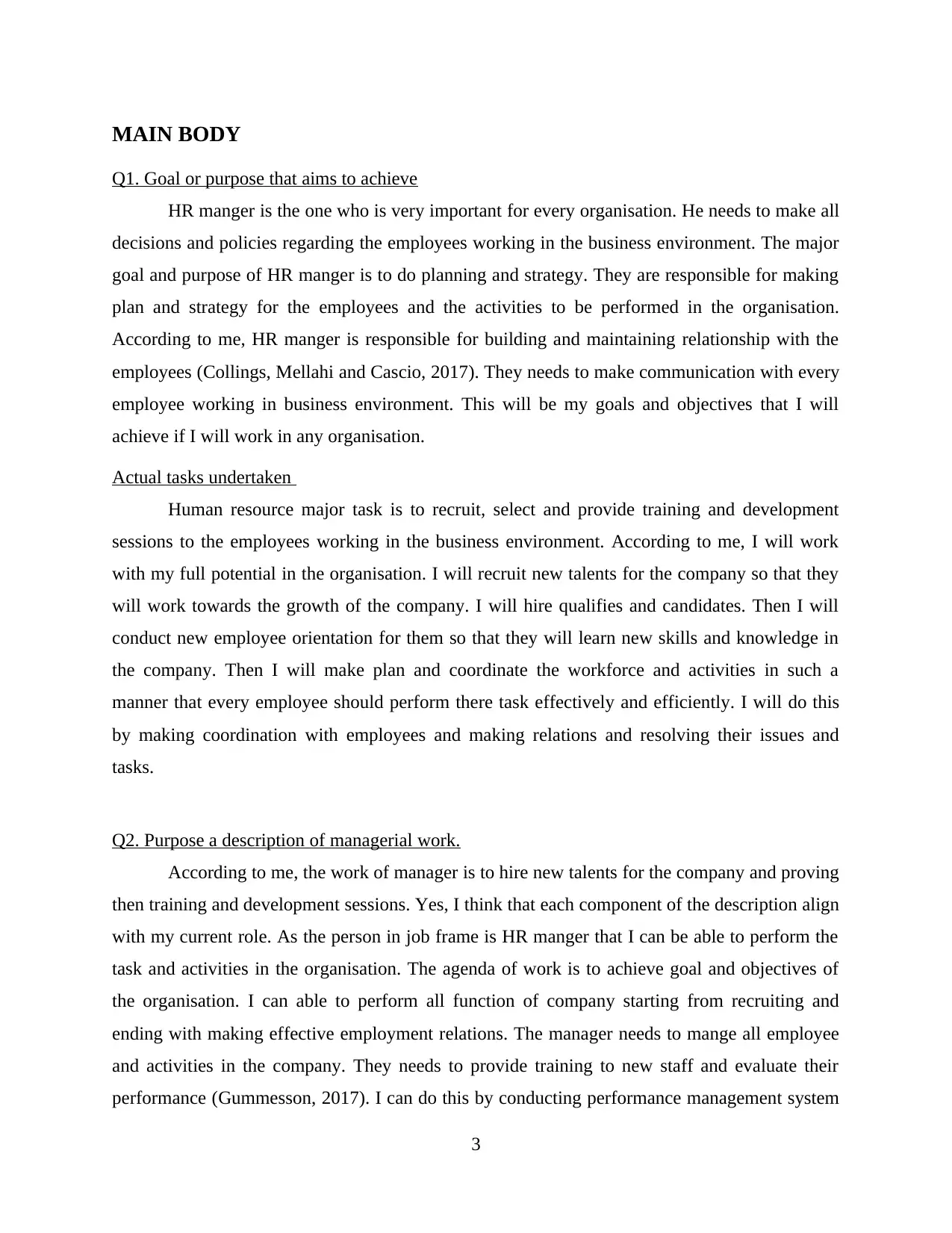
MAIN BODY
Q1. Goal or purpose that aims to achieve
HR manger is the one who is very important for every organisation. He needs to make all
decisions and policies regarding the employees working in the business environment. The major
goal and purpose of HR manger is to do planning and strategy. They are responsible for making
plan and strategy for the employees and the activities to be performed in the organisation.
According to me, HR manger is responsible for building and maintaining relationship with the
employees (Collings, Mellahi and Cascio, 2017). They needs to make communication with every
employee working in business environment. This will be my goals and objectives that I will
achieve if I will work in any organisation.
Actual tasks undertaken
Human resource major task is to recruit, select and provide training and development
sessions to the employees working in the business environment. According to me, I will work
with my full potential in the organisation. I will recruit new talents for the company so that they
will work towards the growth of the company. I will hire qualifies and candidates. Then I will
conduct new employee orientation for them so that they will learn new skills and knowledge in
the company. Then I will make plan and coordinate the workforce and activities in such a
manner that every employee should perform there task effectively and efficiently. I will do this
by making coordination with employees and making relations and resolving their issues and
tasks.
Q2. Purpose a description of managerial work.
According to me, the work of manager is to hire new talents for the company and proving
then training and development sessions. Yes, I think that each component of the description align
with my current role. As the person in job frame is HR manger that I can be able to perform the
task and activities in the organisation. The agenda of work is to achieve goal and objectives of
the organisation. I can able to perform all function of company starting from recruiting and
ending with making effective employment relations. The manager needs to mange all employee
and activities in the company. They needs to provide training to new staff and evaluate their
performance (Gummesson, 2017). I can do this by conducting performance management system
3
Q1. Goal or purpose that aims to achieve
HR manger is the one who is very important for every organisation. He needs to make all
decisions and policies regarding the employees working in the business environment. The major
goal and purpose of HR manger is to do planning and strategy. They are responsible for making
plan and strategy for the employees and the activities to be performed in the organisation.
According to me, HR manger is responsible for building and maintaining relationship with the
employees (Collings, Mellahi and Cascio, 2017). They needs to make communication with every
employee working in business environment. This will be my goals and objectives that I will
achieve if I will work in any organisation.
Actual tasks undertaken
Human resource major task is to recruit, select and provide training and development
sessions to the employees working in the business environment. According to me, I will work
with my full potential in the organisation. I will recruit new talents for the company so that they
will work towards the growth of the company. I will hire qualifies and candidates. Then I will
conduct new employee orientation for them so that they will learn new skills and knowledge in
the company. Then I will make plan and coordinate the workforce and activities in such a
manner that every employee should perform there task effectively and efficiently. I will do this
by making coordination with employees and making relations and resolving their issues and
tasks.
Q2. Purpose a description of managerial work.
According to me, the work of manager is to hire new talents for the company and proving
then training and development sessions. Yes, I think that each component of the description align
with my current role. As the person in job frame is HR manger that I can be able to perform the
task and activities in the organisation. The agenda of work is to achieve goal and objectives of
the organisation. I can able to perform all function of company starting from recruiting and
ending with making effective employment relations. The manager needs to mange all employee
and activities in the company. They needs to provide training to new staff and evaluate their
performance (Gummesson, 2017). I can do this by conducting performance management system
3
⊘ This is a preview!⊘
Do you want full access?
Subscribe today to unlock all pages.

Trusted by 1+ million students worldwide
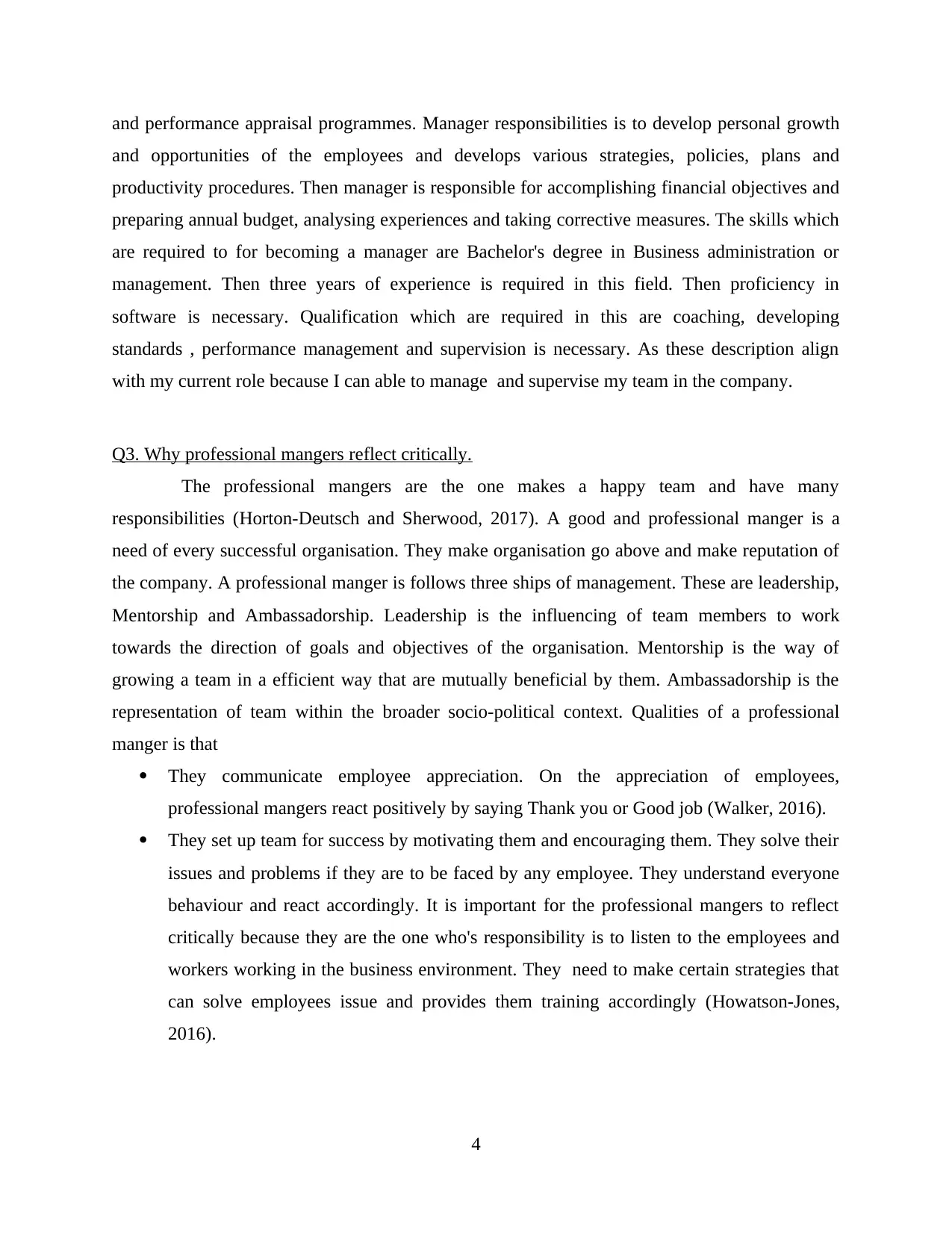
and performance appraisal programmes. Manager responsibilities is to develop personal growth
and opportunities of the employees and develops various strategies, policies, plans and
productivity procedures. Then manager is responsible for accomplishing financial objectives and
preparing annual budget, analysing experiences and taking corrective measures. The skills which
are required to for becoming a manager are Bachelor's degree in Business administration or
management. Then three years of experience is required in this field. Then proficiency in
software is necessary. Qualification which are required in this are coaching, developing
standards , performance management and supervision is necessary. As these description align
with my current role because I can able to manage and supervise my team in the company.
Q3. Why professional mangers reflect critically.
The professional mangers are the one makes a happy team and have many
responsibilities (Horton-Deutsch and Sherwood, 2017). A good and professional manger is a
need of every successful organisation. They make organisation go above and make reputation of
the company. A professional manger is follows three ships of management. These are leadership,
Mentorship and Ambassadorship. Leadership is the influencing of team members to work
towards the direction of goals and objectives of the organisation. Mentorship is the way of
growing a team in a efficient way that are mutually beneficial by them. Ambassadorship is the
representation of team within the broader socio-political context. Qualities of a professional
manger is that
They communicate employee appreciation. On the appreciation of employees,
professional mangers react positively by saying Thank you or Good job (Walker, 2016).
They set up team for success by motivating them and encouraging them. They solve their
issues and problems if they are to be faced by any employee. They understand everyone
behaviour and react accordingly. It is important for the professional mangers to reflect
critically because they are the one who's responsibility is to listen to the employees and
workers working in the business environment. They need to make certain strategies that
can solve employees issue and provides them training accordingly (Howatson-Jones,
2016).
4
and opportunities of the employees and develops various strategies, policies, plans and
productivity procedures. Then manager is responsible for accomplishing financial objectives and
preparing annual budget, analysing experiences and taking corrective measures. The skills which
are required to for becoming a manager are Bachelor's degree in Business administration or
management. Then three years of experience is required in this field. Then proficiency in
software is necessary. Qualification which are required in this are coaching, developing
standards , performance management and supervision is necessary. As these description align
with my current role because I can able to manage and supervise my team in the company.
Q3. Why professional mangers reflect critically.
The professional mangers are the one makes a happy team and have many
responsibilities (Horton-Deutsch and Sherwood, 2017). A good and professional manger is a
need of every successful organisation. They make organisation go above and make reputation of
the company. A professional manger is follows three ships of management. These are leadership,
Mentorship and Ambassadorship. Leadership is the influencing of team members to work
towards the direction of goals and objectives of the organisation. Mentorship is the way of
growing a team in a efficient way that are mutually beneficial by them. Ambassadorship is the
representation of team within the broader socio-political context. Qualities of a professional
manger is that
They communicate employee appreciation. On the appreciation of employees,
professional mangers react positively by saying Thank you or Good job (Walker, 2016).
They set up team for success by motivating them and encouraging them. They solve their
issues and problems if they are to be faced by any employee. They understand everyone
behaviour and react accordingly. It is important for the professional mangers to reflect
critically because they are the one who's responsibility is to listen to the employees and
workers working in the business environment. They need to make certain strategies that
can solve employees issue and provides them training accordingly (Howatson-Jones,
2016).
4
Paraphrase This Document
Need a fresh take? Get an instant paraphrase of this document with our AI Paraphraser
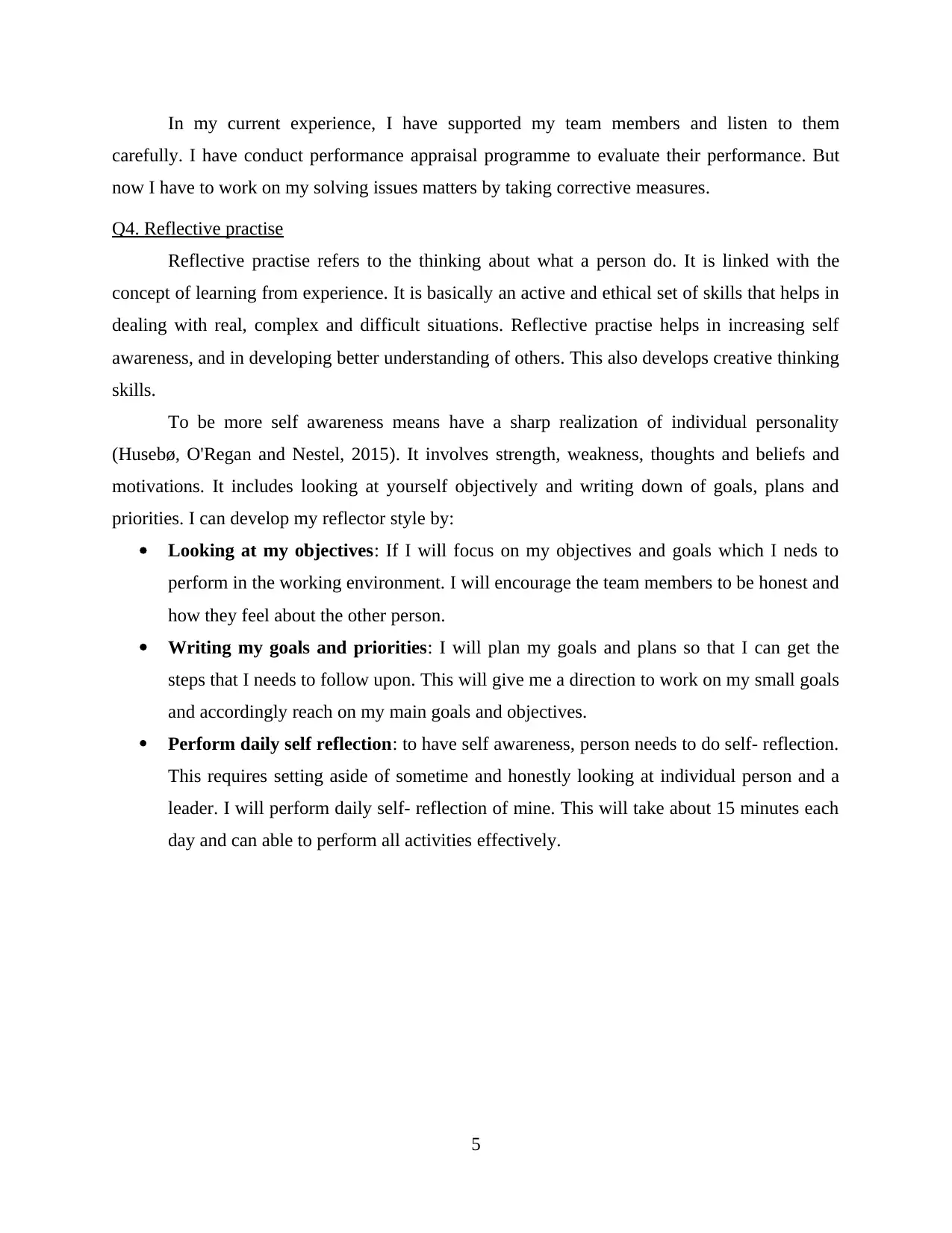
In my current experience, I have supported my team members and listen to them
carefully. I have conduct performance appraisal programme to evaluate their performance. But
now I have to work on my solving issues matters by taking corrective measures.
Q4. Reflective practise
Reflective practise refers to the thinking about what a person do. It is linked with the
concept of learning from experience. It is basically an active and ethical set of skills that helps in
dealing with real, complex and difficult situations. Reflective practise helps in increasing self
awareness, and in developing better understanding of others. This also develops creative thinking
skills.
To be more self awareness means have a sharp realization of individual personality
(Husebø, O'Regan and Nestel, 2015). It involves strength, weakness, thoughts and beliefs and
motivations. It includes looking at yourself objectively and writing down of goals, plans and
priorities. I can develop my reflector style by:
Looking at my objectives: If I will focus on my objectives and goals which I neds to
perform in the working environment. I will encourage the team members to be honest and
how they feel about the other person.
Writing my goals and priorities: I will plan my goals and plans so that I can get the
steps that I needs to follow upon. This will give me a direction to work on my small goals
and accordingly reach on my main goals and objectives.
Perform daily self reflection: to have self awareness, person needs to do self- reflection.
This requires setting aside of sometime and honestly looking at individual person and a
leader. I will perform daily self- reflection of mine. This will take about 15 minutes each
day and can able to perform all activities effectively.
5
carefully. I have conduct performance appraisal programme to evaluate their performance. But
now I have to work on my solving issues matters by taking corrective measures.
Q4. Reflective practise
Reflective practise refers to the thinking about what a person do. It is linked with the
concept of learning from experience. It is basically an active and ethical set of skills that helps in
dealing with real, complex and difficult situations. Reflective practise helps in increasing self
awareness, and in developing better understanding of others. This also develops creative thinking
skills.
To be more self awareness means have a sharp realization of individual personality
(Husebø, O'Regan and Nestel, 2015). It involves strength, weakness, thoughts and beliefs and
motivations. It includes looking at yourself objectively and writing down of goals, plans and
priorities. I can develop my reflector style by:
Looking at my objectives: If I will focus on my objectives and goals which I neds to
perform in the working environment. I will encourage the team members to be honest and
how they feel about the other person.
Writing my goals and priorities: I will plan my goals and plans so that I can get the
steps that I needs to follow upon. This will give me a direction to work on my small goals
and accordingly reach on my main goals and objectives.
Perform daily self reflection: to have self awareness, person needs to do self- reflection.
This requires setting aside of sometime and honestly looking at individual person and a
leader. I will perform daily self- reflection of mine. This will take about 15 minutes each
day and can able to perform all activities effectively.
5
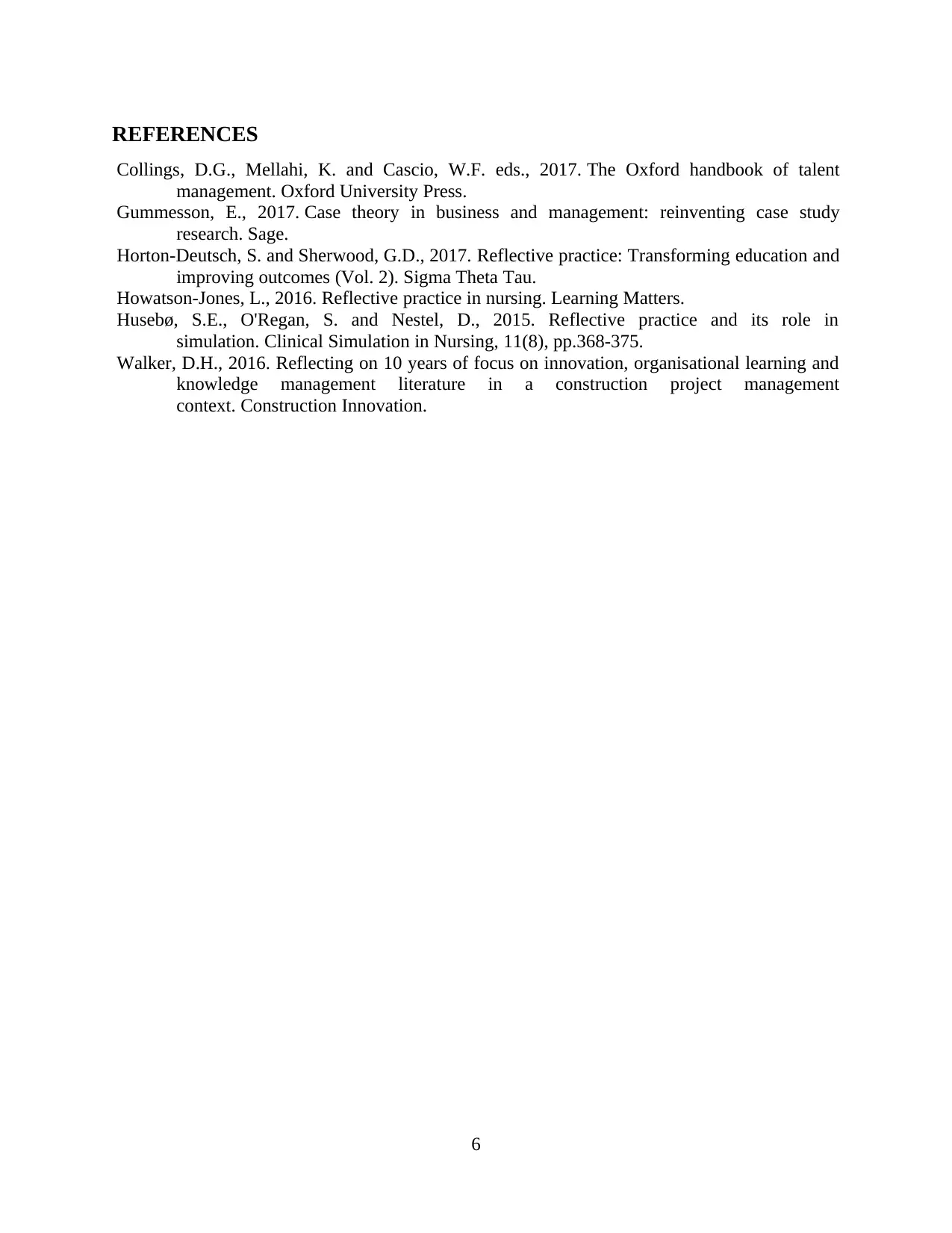
REFERENCES
Collings, D.G., Mellahi, K. and Cascio, W.F. eds., 2017. The Oxford handbook of talent
management. Oxford University Press.
Gummesson, E., 2017. Case theory in business and management: reinventing case study
research. Sage.
Horton-Deutsch, S. and Sherwood, G.D., 2017. Reflective practice: Transforming education and
improving outcomes (Vol. 2). Sigma Theta Tau.
Howatson-Jones, L., 2016. Reflective practice in nursing. Learning Matters.
Husebø, S.E., O'Regan, S. and Nestel, D., 2015. Reflective practice and its role in
simulation. Clinical Simulation in Nursing, 11(8), pp.368-375.
Walker, D.H., 2016. Reflecting on 10 years of focus on innovation, organisational learning and
knowledge management literature in a construction project management
context. Construction Innovation.
6
Collings, D.G., Mellahi, K. and Cascio, W.F. eds., 2017. The Oxford handbook of talent
management. Oxford University Press.
Gummesson, E., 2017. Case theory in business and management: reinventing case study
research. Sage.
Horton-Deutsch, S. and Sherwood, G.D., 2017. Reflective practice: Transforming education and
improving outcomes (Vol. 2). Sigma Theta Tau.
Howatson-Jones, L., 2016. Reflective practice in nursing. Learning Matters.
Husebø, S.E., O'Regan, S. and Nestel, D., 2015. Reflective practice and its role in
simulation. Clinical Simulation in Nursing, 11(8), pp.368-375.
Walker, D.H., 2016. Reflecting on 10 years of focus on innovation, organisational learning and
knowledge management literature in a construction project management
context. Construction Innovation.
6
⊘ This is a preview!⊘
Do you want full access?
Subscribe today to unlock all pages.

Trusted by 1+ million students worldwide

7
1 out of 7
Related Documents
Your All-in-One AI-Powered Toolkit for Academic Success.
+13062052269
info@desklib.com
Available 24*7 on WhatsApp / Email
![[object Object]](/_next/static/media/star-bottom.7253800d.svg)
Unlock your academic potential
Copyright © 2020–2026 A2Z Services. All Rights Reserved. Developed and managed by ZUCOL.





